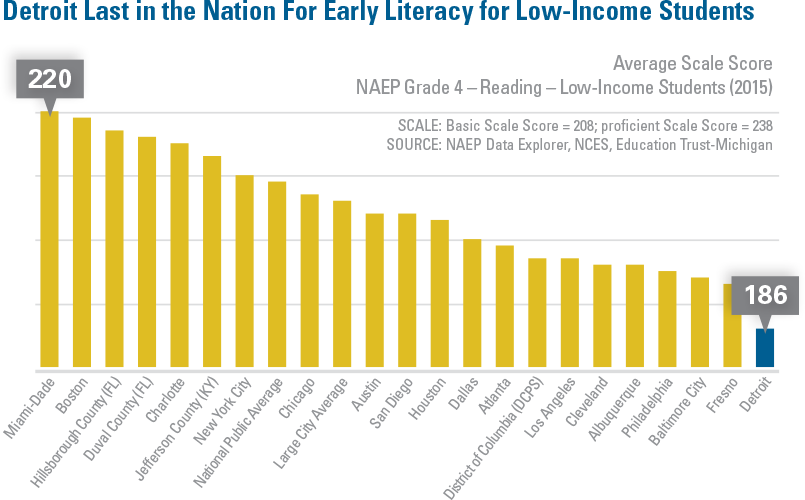Learn to Read, Then Read to Learn
Reading by Third Grade Is Essential
What We Know
Early literacy is essential for future student success. Before third grade, students are learning to read; after third grade, they are reading to learn, not just in English class but in every subject. If students cannot read at grade level by the end of third grade, they are more likely to drop out of school and have behavioral problems, less academic success, lower lifetime earnings, and higher unemployment and incarceration rates.

The challenges start early. Low-income students tend to start school far behind; by age 4 they have heard 30 million fewer words than their more advantaged peers. It is very difficult for them to catch up. This is exacerbated by the lack of mandatory kindergarten in Michigan. According to the National Assessment of Educational Progress (NAEP), Michigan was one of.only five states with declining fourth grade reading achievement between 2003 and 2015. And Detroit is last in the nation in early literacy (fourth grade) for low-income students, significantly trailing even the second-to-last urban district.
We want to create a year-round culture of reading so that all Detroit schoolchildren read at grade level by third grade.
TACTICS:
- Because literacy is the foundation of learning, Detroit’s parents, community members, teachers, and school administrators will make Detroit a City of Readers, starting with:
- Enable Detroit parents and caregivers to spend 20 minutes a day introducing language to their children by talking or reading with them from birth forward.
- Orchestrate book drives and support libraries to ensure culturally relevant reading materials are accessible to African-American, Latino and Arab-American students and families.
- Expand summer literacy programming in Detroit, to increase exposure to reading instruction and prevent summer learning loss among students, by partnering with youth development programs and other existing efforts.
- Prepare teachers in clinical training settings to implement best-in-class early literacy programs proven to be successful in urban settings.
- Hold an annual citywide Literacy Education Summit for K-3 and early childhood educators to learn and share best practices, interventions, and innovations to help low-literacy students and English Language Learners. Offer a cross-training model and aligned curriculum.
- Provide alternative ways for students to demonstrate reading proficiency (or meaningful progress) beyond a standardized, computer-based test. Implement a portfolio approach for grade-level advancement and help caregivers understand their legal rights to avoid student retention.
- Strengthen citywide early childhood system by implementing the Hope Starts Here recommendations, including a citywide kindergarten readiness assessment, more supports for caregivers, and more quality early learning and care, so students enter kindergarten ready to learn.
